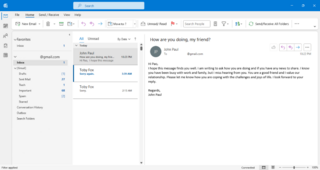
Microsoft Office, or simply Office, is a family of client software, server software, and services developed by Microsoft. It was first announced by Bill Gates on August 1, 1988, at COMDEX in Las Vegas. Initially a marketing term for an office suite, the first version of Office contained Microsoft Word, Microsoft Excel, and Microsoft PowerPoint. Over the years, Office applications have grown substantially closer with shared features such as a common spell checker, Object Linking and Embedding data integration and Visual Basic for Applications scripting language. Microsoft also positions Office as a development platform for line-of-business software under the Office Business Applications brand.

Instant messaging (IM) technology is a type of synchronous computer-mediated communication involving the immediate (real-time) transmission of messages between two or more parties over the Internet or another computer network. Originally involving simple text message exchanges, modern IM applications and services tend to also feature the exchange of multimedia, emojis, file transfer, VoIP, and video chat capabilities.

Windows Messenger is a discontinued instant messaging client included in Windows XP. Designed for use by both corporate and home users, it was originally created, in 2001, as a streamlined and integrated version of MSN Messenger. It was upgraded several times when it was made available for Windows 2000 and Windows Server 2003. Since then, its development stopped. It was superseded by Windows Live Messenger and Microsoft Lync.

Microsoft Outlook is a personal information manager software system from Microsoft, available as a part of the Microsoft 365 software suites. Though primarily being popular as an email client for businesses, Outlook also includes functions such as calendaring, task managing, contact managing, note-taking, journal logging, web browsing, and RSS news aggregation.

Extensible Messaging and Presence Protocol is an open communication protocol designed for instant messaging (IM), presence information, and contact list maintenance. Based on XML, it enables the near-real-time exchange of structured data between two or more network entities. Designed to be extensible, the protocol offers a multitude of applications beyond traditional IM in the broader realm of message-oriented middleware, including signalling for VoIP, video, file transfer, gaming and other uses.
Microsoft Exchange Server is a mail server and calendaring server developed by Microsoft. It runs exclusively on Windows Server operating systems.
HCL Sametime Premium is a client–server application and middleware platform that provides real-time, unified communications and collaboration for enterprises. Those capabilities include presence information, enterprise instant messaging, web conferencing, community collaboration, and telephony capabilities and integration. Currently it is developed and sold by HCL Software, a division of Indian company HCL Technologies, until 2019 by the Lotus Software division of IBM.

Microsoft NetMeeting is a discontinued VoIP and multi-point videoconferencing program offered by Microsoft. NetMeeting allows multiple clients to host and join a call that includes video and audio, text chat, application and desktop sharing, and file sharing. It was originally bundled with Internet Explorer 3 and then with Windows versions from Windows 95 to Windows Server 2003.

Skype for Business Server is real-time communications server software that provides the infrastructure for enterprise instant messaging, presence, VoIP, ad hoc and structured conferences and PSTN connectivity through a third-party gateway or SIP trunk. These features are available within an organization, between organizations and with external users on the public internet or standard phones.
Microsoft Office Live Meeting is a discontinued commercial subscription-based web conferencing service operated by Microsoft. Live Meeting included software installed on client PCs and used a central server for all clients to connect to. The service was shut down on December 31, 2017. Microsoft now produces Skype for Business which is an enterprise Unified Communications product, that can be rolled out either on-premises or in the cloud.

Skype for Business is an enterprise software application for instant messaging and videotelephony developed by Microsoft as part of the Microsoft 365 suite. It is designed for use with the on-premises Skype for Business Server software, and a software as a service version offered as part of 365. It supports text, audio, and video chat, and integrates with Microsoft 365 components such as Exchange and SharePoint.

Radvision was a provider of video conferencing solution and enabling products for IP communication developers based in Tel Aviv, Israel. Radvision was acquired by Avaya in June 2012. Spirent Communications acquired Radvision's Technology Business Unit from Avaya in July 2014, to become Spirent Developer Tools Business Unit.
The Microsoft Speech Server is a product from Microsoft designed to allow the authoring and deployment of IVR applications incorporating Speech Recognition, Speech Synthesis and DTMF.
Live Communications Server 2005, codenamed Vienna, is the second version of a SIP based instant messaging and presence server after Live Communications Server 2003. LCS 2005 was first released in 2005, and was updated with new features with Service Pack 1 in 2006. LCS 2005 has been superseded by Microsoft Office Communications Server 2007.
The Innovative Communications Alliance (ICA) was a telecommunications alliance between Microsoft and Nortel, created in July 2006, to co-develop, integrate, market, sell, and support unified communications products. The goal of the alliance is to make integrated hardware and software solutions that join together voice, video, and data communications without requiring gateways or middleware. Microsoft and Nortel share developing technologies and patents for unified communications products.
Microsoft Online Services was Microsoft's hosted-software offering and was an early component of its software as a service strategy. Microsoft Online Services was hosted by Microsoft and sold with Microsoft partners.

Actiance Inc. was an American-based multinational corporation that developed platforms required to enable security, management, and compliance of unified communications, Web 2.0, and social media channels. Headquartered in Redwood City, California, Actiance supported social networks, unified communications providers and Instant Messaging platforms, including Facebook, LinkedIn, Twitter, AOL, Google, Yahoo!, Skype, Microsoft, IBM and Cisco.

A Microsoft account or MSA is a single sign-on personal user account for Microsoft customers to log in to consumer Microsoft services, devices running on one of Microsoft's current operating systems, and Microsoft application software.








